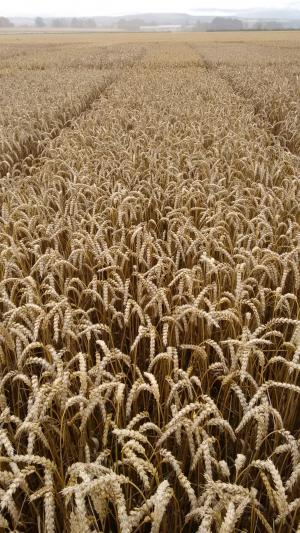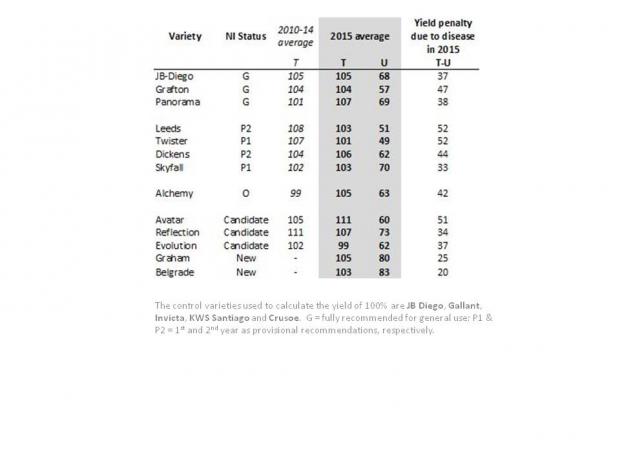In the recent harvest, two winter wheat varieties, KWS Barrel and Avatar, achieved over 14 t/ha in the variety trials conducted by AFBI Crossnacreevy. Average yields of plots treated with fungicides in the trial at Limavady in 2015 were 13.0 t/ha, placing it 7th out of 27 trials in the Agriculture and Horticulture Development Board’s (AHDB) UK trialling system. These yields were on average 2 t/ha higher than the 2014 NI trial average and 2.5 t/ha higher than the 5-year NI trial average for 2010-2014.

In this article the varieties most suitable for the NI market, potential newcomers and the importance of disease resistance when selecting winter wheat varieties to sow, are discussed.
Disease pressure in 2015
Pressure from Septoria tritici was very high in 2015. Untreated yields were on average 40% lower than yields from plots treated with fungicides, with the difference ranging from as little as 20% in Belgrade to a huge yield penalty of 58% in KWS Barrel. Infections started to build up in untreated plots as early as April. By early July, infections ranged from less than 4% of the leaf area infected in Cougar to 85% in Gallant, with disease recorded in all 49 varieties under trial. Later in the season, disease pressure from Fusarium was high. Once again, all varieties in the untreated plots were affected, with infections ranging from less than 10% in a handful of varieties, including Alchemy and Monterey, to over 75% in Gallant and Grafton. Even in plots receiving the comprehensive AHDB spray programme, disease (both Fusarium and Septoria) still broke through, Fusarium ranged from 0.1% in Alchemy and Monterey and reached as high as 20% in new varieties Reflection and Graham whilst Septoria was also recorded in all varieties in the treated plots, ranging from 3% in Cougar to 45% in Gallant.
Performance of recommended varieties
JB Diego, currently the top fully recommended variety on the DARD Recommended List, once again gave a very good performance, 105% of the mean of the treated control varieties. It is one of the most consistent yielding winter wheat varieties currently available. Its untreated yield was also quite good with a yield penalty of 37% due to disease. JB Diego is a good second wheat, has quite good straw strength and is early to ripen. Grafton too maintained high yields, 104% of the treated controls, although it suffered without fungicide due to high levels of Fusarium – a disease to which it appears to have poor resistance. Panorama performed very well this year, yielding 107% of treated controls. As with all varieties, though, choices should be based on the long-term average rather than the performance from one year.

Newer varieties
Reflection is a newer variety in its second year in trials in N Ireland. It has many attractive attributes including high yields – 107 and 73% of treated controls for treated and untreated, respectively, large grain with high specific weight, early ripening, reasonable disease resistance. Avatar, a variety on the DAFM list, has also performed very well again. It gave an impressive 111% treated yield, although its yield penalty (51%) suggests it needs careful fungicide management. It too has large grain and high specific weight but it may have a degree of susceptibility to sprouting. Evolution has been performing extremely well in Great Britain, but in N. Ireland it has not realised this potential. Its yields have fallen 3% compared to its longer term average and it is late to ripen here.
The most impressive yield of all, 14.2 t/ha, 112% of the controls, was from KWS Barrel, a newcomer to the trials in 2015. It is also exciting that the untreated yields of some of the newer varieties are relatively high. Two varieties, Belgrade and Graham, both bring the option of selecting a variety that has good resistance to Septoria tritici. In a year where even the AHDB spray protocol did not give complete protection against Septoria, these two varieties resisted the disease well, even without fungicide. Increasingly, growers are going to have to rely on both fungicides and varietal resistance to have any chance of controlling Septoria in a high disease pressure year. Both Belgrade and Graham have treated yields that are lower than the highest yielding varieties but offer untreated yields of 80%+ and low yield penalties. The genetics of these more resistant varieties could determine future of winter wheat growing in cool, wet climates such as Northern Ireland and Ireland.
Summary
The aims of the AFBI variety trials include identifying those varieties which have high yields along with consistency and resilience when grown in the challenging conditions prevalent in Northern Ireland. Performance in 2015 trials will contribute towards singling out the varieties best suited for the 2016 AFBI/DARD Winter Wheat Recommended List. Further information on the harvest results from AFBI variety trials can be obtained from AFBI Crossnacreevy (phone no: +44(0)28 9054 8000). Variety information is also available on this page and at www.hgca.com.
Notes to editors:
AFBI carries out high-quality technology research and development, statutory, analytical, and diagnostic testing functions for DARD and other Government departments, public bodies and commercial companies.
AFBI's Vision is “Scientific excellence in Northern Ireland … serving the world”.
All media enquiries to AFBI Press Office.
Latest news
- AFBI issues Nematodirus warning – Spring 2025 11 April 2025
- Managing Nature Based Risks to the UK Economy and Opportunities for Green Finance 08 April 2025
- AFBI Hillsborough host AERA committee 27 March 2025
- The Omics Days Conference 27 March 2025
